
Diane Coyle has a blog post called "Classics for economists," and someone on Twitter requested that I do a companion piece called "Science fiction for economists", so here it is.
Really, most science fiction is about economics. What makes most future visions interesting is not just the technical particulars of the cool new Stuff, but the social ramifications. Here are some of the sci-fi books that I thought dealt with important economic issues in the most insightful and interesting ways. I also chose only books that I think are well-written, with well-conceived characters, engaging plots, and skillful writing.
1. A Deepness in the Sky, by Vernor Vinge
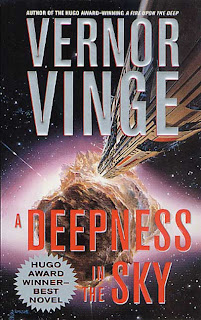
In addition to being quite possibly the best science fiction novel I've ever read, Deepness is also a great meditation on public economics. When Vernor Vinge became famous in the 80s, he was a hard-core libertarian - his novel The Peace War, and its sequel short story "The Ungoverned", are like a Real Business Cycle model come to life, with lone-wolf genius engineers teaming up with private police forces to bring down a fascist technocratic government made up of...university administrators. Ha. But by the 90s, Vinge's views on government and markets had become markedly more nuanced - in the swashbuckling space opera A Fire Upon the Deep, we see private security forces failing miserably when faced with a powerful external threat (in fact, that book made me think of the "Tamerlane Principle"). Security, Vinge realizes, is a public good.
In Deepness, Vinge adds another public good: Research. The narrative of Deepness is split between a race of spider-people with roughly 20th-century technology, and a spacefaring guild of human merchants called the Qeng Ho. On the spider world, the protagonist is a brilliant scientist named Sherkaner Underhill, who is basically a Von Neumann or Feynman type. Sherkaner is the ultimate lone genius, but he ends up needing the government to fund his research. In space, meanwhile, the heroic merchant entrepreneur Pham Nuwen (who is a recurring protagonist in Vinge novels) struggles to decide whether he should turn his merchant fleet into an interstellar government. Governments, he finds, are good at producing really new scientific breakthroughs, but eventually they become unwieldy and stifle the economy and society, then collapse under their own institutional weight. The very very end of the book is - or at least, seemed to me to be - a metaphor for the Great Stagnation and the death (and future rebirth) of Big Science.
2. Makers, by Cory Doctorow
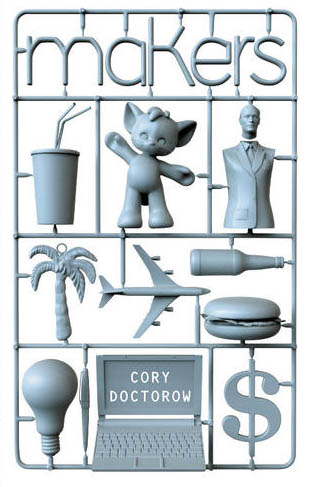
Cory Doctorow is known both for his science fiction and for being the creator of the blog Boing Boing, one of the oldest and best blogs on the internet. In Makers, Doctorow dishes up a near future that is almost spooky in its prophetic vision. The book is all about economics, the death of corporations, the rise of freelance and temp economies, the death of old media and the rise of blogs, and the disruptive impact of technology on people's jobs. It envisions the rise of 3D printing, the startup craze (and the startup glut), and the use of intellectual property as corporations' weapon of choice to fight back against progress. It's incredibly well-written, but also extremely sad, just to warn you.
3. The Dispossessed, by Ursula K. LeGuin
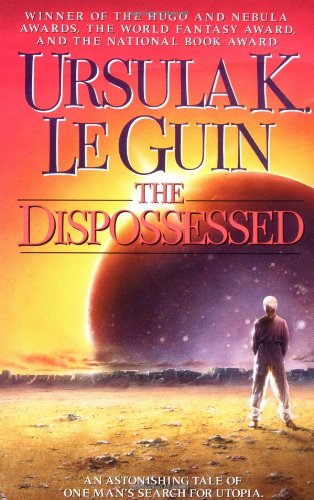
It's incredibly hard to imagine a world without private property, but LeGuin pulls it off. Spoilers: A world without property is pretty boring and fairly poor. But LeGuin also shows us another world, much like our own, where the anti-property anarcho-syndicalist movement was suppressed and tamed, much like Marxism was suppressed and tamed here on Earth. What's interesting is that although anarcho-syndicalism doesn't work incredibly well on the world where it's implemented, the anarcho-syndicalist idea and movement serve as a sort of permanent opposition force on the capitalist world. When I read Robert M. Buckley writing that Marxism has fulfilled a similar role in the West here on Earth, I immediately thought of The Dispossessed.
4. Down and Out in the Magic Kingdom, by Cory Doctorow
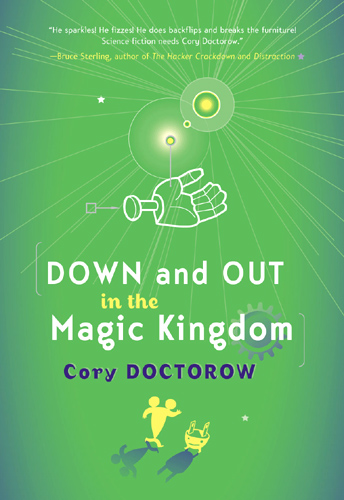
Doctorow again. In this book, he examines what a true post-scarcity society would look like. Spoiler: It looks a lot like a bunch of sarcastic bohemian Canadian people. But basically, I think that's probably what the future will look like, at least if we're lucky. Anyway, this book is notable for the concept of "whuffie", an online currency based on peer approval, which arguably inspired Facebook's "like" button.
5. Rainbows End, by Vernor Vinge
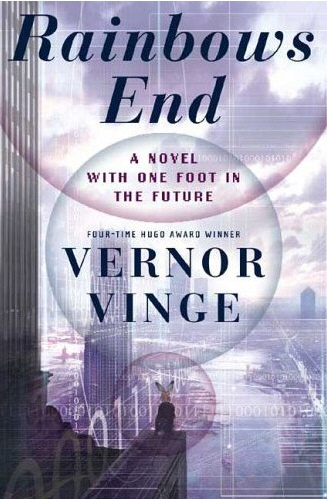
Vinge again. Rainbows End is a sad, thoughtful novel about old age and obsolescence (notice that there is no apostrophe in the title). But it's also one of the most visionary novels about future labor markets. In an interconnected world in which skills never stay fresh for long and most value is created through entertainment, old engineers have to go back to high school, and new corporations are started by teenagers collaborating online with strangers halfway around the world. Rainbows End is also famous for envisioning the technology of Augmented Reality; this novel probably inspired Google Glass. Interestingly, Vinge continues his evolution toward a balanced view of public goods, adding education to the list of things that government needs to provide. (Update: In an email, Vinge points out that he never specified that the high school in Rainbows End was government-funded! Touche!)
6. Accelerando, by Charles Stross

Charles Stross, another noted blogger, loves to play with ideas, even if he doesn't believe in them. In Accelerando, he mainly plays with the idea of the Singularity, but he also plays with a bunch of far-out funky future economics. In one part, the main character, impresario and wandering entrepreneur Manfred Macx, uses advanced computer algorithms to successfully implement an optimal centrally planned economy, by predicting what humans will want before they even know they want it. Macx's various disruptive innovations inevitably draw the ire of the law, and he creates a protective cloud of AI lawyers to wage constant "lawfare" against governments and corporations alike. In another part of the book, the entire solar system is taken over by sentient High-Frequency Trading algorithms. But I haven't really spoiled the book for you, since these are only about 0.1% of the ideas contained within. Note: Stross has also written a series called the Merchant Princes series that deals even more with economics, but I haven't read it.
7. Lucifer's Hammer, by Larry Niven and Jerry Pournelle
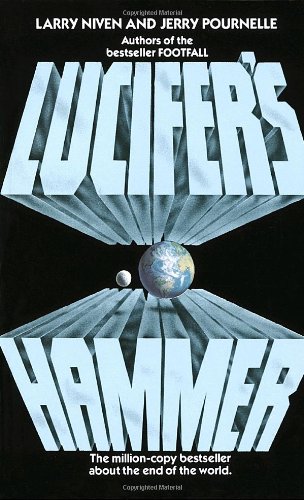
Lucifer's Hammer is a story about a comet hitting Earth, and the aftermath. It's notable for its quaint Reaganite conservative politics (it came out in 1977), and does make a couple of glaring economic mistakes (for example, a guy trying to build a nuclear power plant is an independent wildcatting entrepreneur instead of a giant government-backed corporation). But it makes up for that with its excellent portrayal of what the economy would be like in the immediate aftermath of an abrupt civilizational collapse. Hint: Farming, containment of contagious diseases, de-specialization of labor, and collective security become very very important.
8. The Windup Girl, by Paolo Bacigalupi

Brutally dark and hopeless, The Windup Girl is a book about peak oil, global civilizational decline, and the (temporary) end of positive-sum economies. In a suddenly overpopulated world, humans are forced into a constant Hobbesian zero-sum game, and most moral norms go right out the window. Warning: This is very tough book to read. But it serves as an important reminder of the Malthusian menace that forever lurks just outside the circle of light provided by the flickering candle-flame of modern technology.
9. The Moon is a Harsh Mistress, by Robert Heinlein
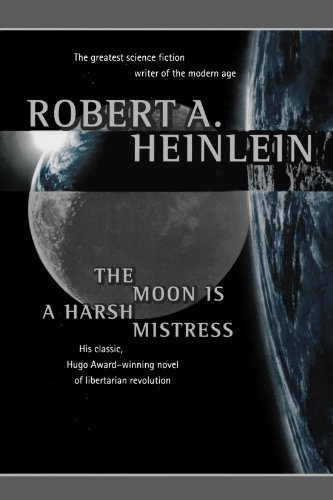
Actually a mythic retelling of the American Revolution, The Moon is a Harsh Mistress contains some very interesting thoughts on colonialism and the Resource Curse. Unsurprisingly, terrorism is used as a way to make resource colonialism too expensive for the occupying power. Unfortunately, we don't get to see the political struggles and despotic regimes that probably arose in the aftermath of lunar independence. But Heinlein also does use the book to play with some interesting libertarian ideas, like a privatized court system.
10. Schismatrix, by Bruce Sterling

Simply one of the most wide-ranging and visionary science fiction novels ever written. Bruce Sterling is like an eternally erupting quasar of creativity, and this is his finest book. None of the economics here makes any sense - or, more accurately, it all takes place in such a funky, crazy future world that it's impossible to know if it makes any sense.
11. Permutation City, by Greg Egan
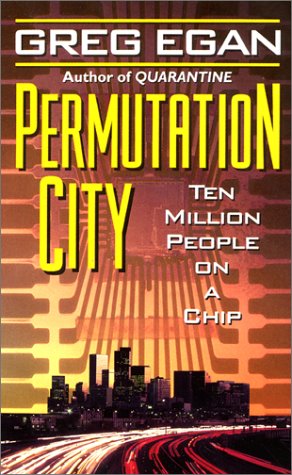
If there's any sci-fi novel that beats Schismatrix for far-out blow-your-brain-out-the-back-of-your-skull vision, it's Permutation City. If I hadn't already had the idea for D-Mod, this book (written over a decade before I thought of the concept) would have given it to me fully formed. Permutation City is about the ultimate nature and purpose of human consciousness and experience, and yet it has implications for technologies that are being developed right now, as we speak.
12. Reamde, by Neal Stephenson

Most people would recommend Stephenson's Snow Crash or Cryptonomicon, but for economics I like Reamde the best. Although not technically sci-fi, it has that flavor. The hero is an aging tech entrepreneur who owns a game that's a combination of World of Warcraft and Bitcoin (yes, this book predicts Bitcoin). It also deals with the economic incentives of the Russian mob, the challenges facing smart young tech workers in China and Hungary, and lots of other cool features of today's global economy. It's not Stephenson's #1 awesomest book, though; that would be Anathem.
13. The Game of Thrones series, by George R.R. Martin

Actually, I lied earlier...the person who requested a "Sci-fi for economists" list also asked me to include fantasy. But the Game of Thrones books (actually called A Song of Ice and Fire, though few use that name anymore) are really the only fantasy novels I can think of that deal with economics in an interesting way. You get to see a lot of the messed-up economies of medieval times, including feudalism, slavery, anarchy, blood sport, and the difficulty of international trade with poor information and unreliable transportation.
Anyway, there's my list. I haven't read everything out there, obviously - I hear that Ken MacLeod's books have a lot of economics in them, for instance, as well as some of Heinlein's other works. But if you're in the econ field and you want to think big deep thoughts about economics under different technological and social conditions, these books are for you. They're also a lot of fun.
Update: Mark Palko looks at "Crime novels for economists". Diane, looks like you started a meme!
Update 2: Other sci-fi recommendations via Paul Krugman and Tim Worstall.
Update 3: A couple of additions...
14. The Year of the Flood, by Margaret Atwood
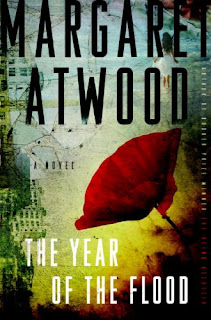
I had a very good reason for omitting this book from the original list: I hadn't read it yet. Now I have. The Year of the Flood is the companion novel to Oryx and Crake, a philosophical dystopia/apocalypse novel (and one of the best such novels ever written, IMHO). But you can read The Year of the Flood on its own. This book is, basically, about a market dystopia. Everything is for sale in this future, and yet negative externalities, asymmetric information, and weak institutions make the world a nightmare.
15. When Gravity Fails, by George Alec Effinger
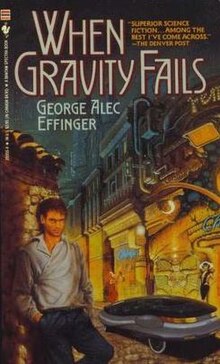
Don't know why I forgot this one earlier. It's basically a novel about underground economies and organized crime. Interesting for those who like to think about the economics of such things. Also, an extremely well-written and fun book.
16. Stand on Zanzibar, by John Bruenner
.jpg/200px-StandOnZanzibar(1stEd).jpg)
A lot of commenters have been mentioning this one, and they're absolutely right. Stand on Zanzibar is a little dated, but it really picks up on a lot of economic trends that were just starting in the 60s (e.g. the pricing of previously plentiful commodities such as water). The economics are all about the effects of overpopulation, which seems less menacing in the 2010s, but is still a major problem in parts of the world. A great futurist novel from the past.
Note: Still no Foundation series. I love the Foundation series, and it's really fun, but the economics are crappy (agglomeration economies encourage the collapse of empires?). And more importantly, the whole conceit of psychohistory is very dangerous for economists; our models will never forecast that well, the Universe is stochastic rather than deterministic, and we should avoid the temptation for intellectual hubris. Foundation is social science's "physics envy" writ large. We are not, and will never be, Hari Seldon, so Foundation, classic as it is, doesn't go on my list!
When Hari Seldon predicted his exclusion from this list a single tear rolled down his cheek.
ReplyDeleteInteresting list, but this comment is the best part of the post.
DeleteFun fact: when Paul Krugman gave his Nobel acceptance speech, he said Asimov's Foundation series in general and Hari Seldon in particular were what sparked his interest in economics.
Delete> Interesting list, but this comment is the best part of the post.
DeleteBravo!
Haha, Yes!
Delete*Nerd Alert* I would actually trace the idea of Augmented Reality and Google Glass back to another science fiction visionary, William Gibson (See Virtual Light, circa 1994 and the follow up books in the Bridge Trilogy).
ReplyDelete+1 for including The Windup Girl
IIRC the sunglasses in Virtual Light could connect to the net, but couldn't put visual overlays on top of real objects...could they?
DeleteAnd as for who first imagined stuff, I'm pretty sure it was all dreamed up by either E.E. Doc Smith, Jack Vance, or Isaac Asimov. But they didn't always explore in detail the ideas they tossed off...like when Vance predicted the portable personal computer (which he called a "mnemophot")...
DeleteThe first projected head-up displays (HUDs) were put in airplane cockpits in the 1940s, and Ivan Sutherland developed a working head-mounted display (HMD) in the mid-1960s. Prototypes of augmented reality systems were running in research labs in the early 1990s; coincidentally (or maybe not) Thad Starner, a technical manager for Google Glass, has used a wearable computer since 1993. I'd guess that AR might have appeared in science fiction before these points, but I don't know of any early stories about it.
DeleteGibson's Spook Country is explicitly about Augmented Reality (amongst other things) though, although I guess it's debatable whether it's SciFi
DeleteIIRC the sunglasses in Virtual Light could connect to the net, but couldn't put visual overlays on top of real objects...could they?
DeleteYes, they could - they're loaded with the plans for the redevelopment of San Francisco, and so when you put them on and look out across the Bay, you can see planned tower blocks overlaid on the actual view of the city.
And, come to that, so could Hiro's beltpack computer in "Snow Crash".
DeleteIt's hard to claim Gibson's Blue Ant series as SciFi, since they take place here and now.
DeleteDefinitely a list that's missing Monument by Lloyd Biggle Jr. That books all economics! (And brilliant) http://en.wikipedia.org/wiki/Monument_%28novel%29
ReplyDeleteUnderstanding you can't include every book, but I think Kim Stanley Robinson's Mars Trilogy dealt a ton with economics, both the alternatives to capitalism such as the gift economy and ecoeconomics, as well as the trajectory of our current transnational corporations becoming first partners of states, then overlords of states, and finally transcending states entirely (metanationals). His faith in the renewed interest in and efficacy of neomarxist and neoanarchist ideas certainly struck me.
ReplyDeleteMan, I really just don't like those books...different strokes I guess!
DeleteInteresting because from what I understand (not having read the Mars Trilogy), the economics are based on the Social Credit movement - which was the economics described in Heinlein's "Beyond This Horizon." This can be traced back to Heinlein's involvement with a splinter party during the depression in California but should not be confused with the eugenics (light) nor the Wild West Society of formal dueling also featured in that book.
DeleteFrom your clearly Libertarian bent, I should imagine that you would find something to like in CH Douglas's quotation: "Systems were made for men, and not men for systems, and the interest of man which is self-development, is above all systems, whether theological, political or economic." Douglas was the creator of the Social Credit Movement.
Stanley Robinson does too much hand waving on economic issue for it to be interesting at all. It would have been infinitely more interesting if he showed some detail. "the marxist alternative works - it just does "
Delete...but the colonization aspects are more interesting
I love the Mars Trilogy but the more detailed the Martian "eco-economics" stuff got, the less convincing or compelling I found it. On the other hand, I did really appreciate the presentation of the more conventional co-operativist ideas and their relation to the developing Martian political order.
DeletePermutation City is wicked good. It's also very good for helping one to understand the philosophy behind the whole concept of "models" (because of the three different virtual realities in the book), which has implications for any field but is particularly important for economics, I think, where simplifying assumptions like rationality are so essential.
ReplyDeleteScience fiction and economics does not get better than Robert Heinlein's first novel, "For us, the living"
ReplyDeleteFor the love of all that is good and worthy, let's hope it does.
Delete"For Us, the Living" made for an interesting treatise, and an early look at some germs of themes to which Heinlein would return and more fully flesh out.
As engaging literature, with a compelling plotline, sympathetic and recognizably human characters, and the spare, folksy-professorial style, for all of which RAH would soon become beloved, as well as respected and influential, it makes for an interesting treatise.
I would strongly suggest 'Stand on Zanzibar' by John Brunner as an amazingly accurate view of the future from the vantage point of the late sixties.
ReplyDeleteAgree. I love that book.
Delete+1 for Zanzibar.
DeleteI know it's not a sciences-fi book but, for post-scarity and trading on status, I would recommend the RPG 'FreeMarket'
http://technoccult.net/archives/2010/08/04/freemarket-interview/
http://projectdonut.com/
Just about every time I turn on the news I think, "Another mucker"
DeleteThanks for mentioning Brunner. He's often overlooked. With this list of 'writers', practically all of whom are afflicted with Keyboard Tourette's (never let one well-written sentence suffice when a full chapter of bloat can take its place), SF has become one boring slog.
DeleteWith this list of 'writers', practically all of whom are afflicted with Keyboard Tourette's (never let one well-written sentence suffice when a full chapter of bloat can take its place), SF has become one boring slog.
DeleteDerp. Down and Out in the Magic Kingdom is like 120 pages long.
Actually I agree with this comment - the trend is toward a crowd of angry authors with torches and pitchforks hanging the editors with bloat following endemically. Neal Stephenson is Exhibit A in this parade of horrors.
Delete'Zanzibar' is good. I would also include 'Shockwave Rider' as an example of how access to information and the lack of that access can be major economic dividers.
DeleteNo love for Arthur C. Clark ?
ReplyDelete"Childhood's End"s utopian future was remarkable.
What about the "Dune" series by Frank Herbert? The original seven books, that is, not the ones co-written between Herbert's son and Kevin J Anderson. Herbert himself wrote it was meant as a study of the interconnections between economics and politics as it was a retelling of the Messiah Myth.
ReplyDeleteJust a thought.
Was just thinking the same thing. Admittedly, the Dune series is among the few (pure) sci-fi novels that I've actually read. However, it seems to me a quintessential tale of resource economics/scarcity, property rights, feudalism, etc.
DeleteYes, but the writing after the first two was appalling. Also, Herbert couldn't add.
DeleteThere's only 6 original Dune books. Unless you count the 7th one that exists only in my imagination.
DeleteI'm agreed that it's only peripherally about economics but I take exception to the use of "appalling". Sure, they weren't as well written, but they weren't terrible. And there's some rather insightful ideas that come up in the later books worthy of some consideration. Again, less about economics than about metaphysics, if you're into that kind of thing.
The only thing really bad about the series is it's ending and the terrible follow up that his son managed to pull off.
Throw a stone horizontally over the Grand Canyon.
DeleteAt the top you have 'Dune' and the quality of the Frank Herbert's subsequent 'Dune' books follow the path of that stone.
How about Ray Kurzweil's "The Singularity is Near"? Or "The Lights in the Tunnel: Automation, Accelerating Technology and the Economy of the Future"?
ReplyDeletehttp://www.thelightsinthetunnel.com/
These sci-fi classics are so meta, they're written to read like airport non-fiction instead of novels.
Great choices, especially Doctorow (though I hear Krugtron doesn't like him??) and Le Guin.
ReplyDeleteSomeone already mentioned Clarke, but they didn't mention the book by him that made me think most about economics, Rendezvous with Rama. (Arcologies, deep spacefaring, semi-sentient robots in hibernation).
Also Tad Williams Otherland series made me think a lot about economic implications of immersive virtual reality web...
Also Philip K. DIck's Radio Free Albemuth made me think a lot about econ/public policy/dystopia, but that may have just been me.
Dick was pretty left-wing, but also paranoid about government and especially Nixon. Nixon stand-ins appear in RFA, Valis, Flow My Tears, and other places. Certain economic ideas do pop up in Dick's work--in Galactic Pot Healer, government money is worthless and only old silver coins have value. In Ubik, cash is replaced by credit cards and AI-driven appliances demand micropayments for every service. Dick clearly valued the work of tradesmen, craftsmen, and artisans, and distrusted faceless corporate entities.
DeleteBut on the whole, I'd have to also mention The Space Merchants as possibly the best SF novel about capitalism.
For economic fantasy I suggest Spice and Wolf, a Japanese novel series (published in English by Yen Press) where the main character is a merchant in a fantasy setting. Plot points include, among others, currency exchange rates and speculation, smuggling, and manipulating commodity prices.
ReplyDeleteI am scooped! But yes. It's one of the few works in any genre where people would think of economics in the description spontaneously, without having to stretch.
DeleteI also second Pohl and Kornbluth's _The Space Merchants_, and maybe Merchants of Venus. SF about advertising, not exactly irrelevant.
Clarke: I think _Imperial Earth_, _The Deep Range_, and _Earthlight_ all have economics issues. As much so as Game of Thrones, anyway.
_Taran Wanderer_ had Taran learning about various crafts, which is something. The later Hodgell novels include a B-plot of "how do I feed my people?" I think economics wandered in and out of the Pern novels; at least, one doesn't have to wonder how the Weyrs feed themselves, and the characters worry about job obsolescence.
It wasn't about exchange rates per se, but that they were minting somewhat debased coins and passing them off as good as the old ones. The plot point seemed based on a common misconception that ancient precious metal coins were supposed to have a constant value, that debasing was cheating. However, in the real world folks were greedy gits who would shave slivers off the sides of coins. Thus the metal content would no longer match the face value of the coin. This is of course the equivalent of debasing coins already in circulation. It also caused headaches for mints because of Gresham's law: the bad drive out the good, in other words the new coins will be hoarded and the old ever-shrinking coins remain in circulation. So it became common practice to debase newly minted coins after a certain time had passed.
DeleteFor a more wonkish explanation of how it worked you can read fr.ex. this:
http://www.voxeu.org/article/medieval-monetary-practices
I re-read Deepness and loved it. That one should really be read for anyone curious as to what a technologically "mature" civilization that would be recognizably human to us would look like. It can be rather depressing - Vinge's book is the only SF novel I've ever read that managed to make a setting consisting of hundreds of colonies scattered across hundreds of light-years (with travel at one-third the speed of light) seem claustrophic. A big part of that story is showing how the forces that shape society can ultimately be beyond even the extraordinary capabilities of someone like Pham Nuwen, and how we respond when we are finally forced to face that.
ReplyDeleteIt also featured augmented reality stuff, although it's treated as banal, common-place technology because that's what it is in-universe. They have heads-up-displays that overlay what they're seeing with "Layers" and interactive displays.
This is a good list (The first book I thought of when I read the title was Rainbows End). A couple of other ideas:
ReplyDeleteIan McDonald's "River of Gods" is a good look at a developed India
"Nekropolis" by Maureen McHugh looks at a possible future North Africa in what seems to me to be a believable way.
McDonald's "Dervish House" has a financial-market subplot which is very nice, and a devotee of the Condorcet theorem.
DeleteC M Kornbluth, space merchants or marching morons
ReplyDeleteNeuromancer ?
even T H White Sword and the Throne ?
straying a bit, the Maj Sjowall Per Wahloo 1980s inspector beck mysteries (sweden's nanny state as uncaring beauracrats)
william Tenn, of mice and men ?
You say that LeGuin pulled off a world without property, and that it's pretty boring. But Anares is an impoverished world, where life would be marginal under any conceivable economy. So, confounded factors. In that sense, LeGuin set herself too easy a task, much as I admire The Dispossessed. How would anarchy have played out on Urras?
ReplyDeletePart of it is that no one wanted to take Anarres away from the anarchists. Could an anarchist Urras have defended itself from a capitalist Anarres? More accurately, the anarchists were given freedom and independence on an otherwise unoccupied moon.
DeleteAs you gentleman point out here, Anares being a barely livable world is the key to the viability of whole society. The ongoing Man against Nature struggle is what provided the ongoing catalyst for the cooperative interaction needed to sustain an anarchist society. But I think what Noah isn't getting in his description, is that a major theme of the book is how much more human and fulfilling that simpler society was than Capitalist Urras. You don't have to agree with this idea of course, to enjoy the book.
DeleteAs I note below, the thing I found most interesting about The Dispossessed is that -- although Annares is clearly a better society to live in than Urras -- Annares is naturally degenerating into bureaucracy and property. It is very hard to maintain the society of Annares. Even with universal education from early childhood.
DeleteThe main plot of half of the book is about the Syndicate of Initiative trying to do *exactly what the philosophy of Annares claims they should be doing*... and being fought at every turn by what can only be called the government of Annares, which isn't even supposed to exist. And getting badmouthed by the majority of the population.
In short, although LeGuin makes it clear that the society of Annares is a better and happier society to live in, *it isn't stable in any way*.
Off topic, but my first exposure to Charles Stross came courtesy of Paul Krugman, who recommended Stross's Laundry Files on his blog. Said books not related to economics, but offer a great mashup of Len Deighton and HP Lovecraft. Just sayin'
ReplyDeleteEach of Stross' Laundry novels is a pastiche of a particular thriller writer:
Delete- the first one was Len Deighton
- the second James Bond
- the third (The Fuller Memorandum) HP Lovecraft I think (ahh, and Antony Price -- the best thriller writer to link military history to spy thrillers). I entirely missed the reference to 'Roskill'. Although the title is a ripoff of 'The Quiller Memorandum' by someone else entirely
- the fourth Modesty Blaise
I eagerly await his pastiche of Alan Furst
Valuethinker
I would have thought "For the Win" by Doctorow would be on any list of his "economic" novels - or is it because it almost doesn't count as sf?
ReplyDelete+1 For The Win. In addition to labor economics, it also has a nice subplot that deals with virtual currency and speculative bubbles.
DeleteAlong with the previously mentioned Dune, I was surprised not to see any H.G. Wells (particularly the Time Machine) and Frederik Pohl (particularly Gateway or Space Merchants)
ReplyDeleteGateway is an interesting shout - I wonder if anyone did an economic analysis of "The Wages of Fear"?
DeleteBitcoin predates Reamde by a few years and I can guarantee that Stephenson knew about it when writing it.Also, the money in the game is more an extrapolation of what is happening in the WoW/Diablo III/Second Life than Bitcoin.
ReplyDeleteNeal Stephenson did predict something very like Bitcoin in his 1999 novel "Cryptonomicon," though.
DeleteHow about Charles Stross' series on development economics: The Family Trade.
ReplyDeleteThomas, I have to respectfully disagree with this suggestion. The Stross series _promises_ to be about development economics, but derails very, very severely. I'm still bitter about that...
DeleteNeal Stephenson's Diamond Age is the best of his books for economists - and a better read than the thriller Reamde.
ReplyDeleteDiamond Age is mind-blowing...until it turns into the Boxer Rebellion!
DeleteWhat about the Baroque Cycle? It is largely historical fiction about the invention of the modern conception of money. And includes awesome scenes of Isaac Newton chasing counterfeiters.
DeleteI second you, Anon. I thought Baroque Cycle--which Stephenson insists is "science fiction" even if most sci-fi types think otherwise--was brilliant in its various meditations on money and early modern/global economies. Reamde would have been more profound had it not gotten so bogged down in 25,000-word eddies involving K'shetra'ie warriors or whatever the hell they're called.
DeleteI haven't read the Baroque Cycle...Stephenson tends to write about the periods of history that I know a lot about, and the more I know about the reality, the more I get annoyed by reading heavily fictionalized historical fiction.
DeleteI would be intertested in your take on the Baroque cycle. Some of it I suspect took great liberties with history - especially the whole trip around southern Asia - but the exploration of credit-finance in Lyons and some of the other bits were quite interesting and fit well with what I understand of the history. Would love to hear your thoughts.
DeleteI second the recommendation for Diamond Age, IMO the ideas in it regarding the effects of nanotechnology, nano-robotics and anonymised internet payment on economics and politics really are mind-blowing and the book is a more cerebral read than reamde which is more of a thriller.
DeleteI also recommend "Death with Interruptions", by Jose Saramago. It´s about the Angel of Death taking a break of her work for a while on a country, and all the political and economical consequences of her unwillingness to work. Brilliant!
ReplyDeleteSounds fascinating.
DeleteThank you for the rec.
Not my favourite Saramago, but i see what you mean. blindness however is an awesome book.
DeletePohl's the Starchild Trilogy rather explores the economics of transplant surgery.....in a most dystopian manner of course.
ReplyDeleteAnd extending out to fantasy "Making Money" by Terry Pratchett is as good a refutation of general gold buggery as I've read.
The Windup Girl is problematic at best and although it's being judged on its 'economic' merits for the purposes of this list, its inclusion here is typical of book lists created by privileged white males.
ReplyDeleteSee here for lesson number 1
And here for lesson number 2
And here for lesson number 3
Including fantasy novels leads to Sir Terry Pratchett's two novels in the Disc-World series, Going Postal and Making Money. As an added treat these books are written with a wonderful sense of humor, which is often lacking in SF.
ReplyDeleteThe whole series is worth reading from an economic point of view, I think (there are lots of things hidden in the background). But it is really Sir Terry Pratchett's intriguing thoughts about the respective nature of science and magic and the relationship they entertain in our own world that makes it (and other works like Strata, and the accompanying books Science of the Disc World) worth reading for any scientist.
DeleteAfter thinking about it for a day, I would add Flatland, by Edwin Abbott Abbott (1884) as another mind enlarging book for scientists.
DeleteThe very beginning of Terry Pratchett's Discworld is a story about an unknown magic that can make gold as worthless as copper, mainly by having a version of the wealthy American or Japanese tourist turn up in town with a lot of the former, this magic being called "reflected-sound-as-of-underground-spirits" - yeah, echo-gnomics. Our tourist proceeds to explain to townspeople about "inn-sewer-ants", and by, well, the first word of the book, in fact,the whole city is burning down.
DeleteNoah, transcending anything Heinlein wrote that touches social philosophy is an essential part of growing up.
ReplyDeleteOther than that, great list; I've been out of SF reading for a while, for no particular reason, but this list includes several I probably should catch up on.
Three Parts Dead by Max Gladstone
ReplyDeleteI'd second Accelerando, Permutation City and the stunning Schismatrix (Doctorow is on my shelf of shame) but I'd like to make a bid for adding Frank Herbert's Dune. While it has some of the trapings of medieval fantasy, these are a consequence of the abandonment machine intelligence in the Butlerian Jihad thousands of years before the events of the novel take place. If you junk AI and repose almost all significant skills in very rare human specialists like the "mentats" (human computers) a guild system supported by a feudal political order is one way in which organizations that invest in this labour power can reap their investment.
ReplyDeleteNot sure where we put Frederick Pohl and Cyril Kornbluth
ReplyDelete'The Space Merchants'
and 'Gladiators at Law'
and also Kornbluth's 'The Syndic'
But TSM is about a world ruled by advertising agencies, where the logic of ever increasing consumption gets them into deep, deep trouble. Gladiators at Law has a world run by supercorporations and if you lose your job, things get very grim indeed. The Syndic has America run by the Mafia, with the government agents trying to get back into power.
Not so much explorations of new economics, but logical extensions of where social trends (as seen in the 1950s) was taking us.
As someone said of The Space Merchants 'it was supposed to be satirical, but as the world it depicts has become more and more true, the humor has lessened'.
Valuethinker
Thanks for this. I've read a lot of these titles and will definitely check out the others, but I'm struck by who's work is NOT on your list... even though you use one of his terms, "Age of Scarcity." You seem to have overlooked author Iain M. Banks and his Culture series, much of which is all about living in an age of unlimited plenty. What's up with that?
ReplyDeleteNot to be a party pooper, but I am most definitely not a fan of the Culture books...I found them unreadably bad...
DeleteKim Stanley Robinson - Years of Rice and Salt
ReplyDeleteEurope wiped out by 14 century plague, history becomes a competition between Han Chinese and Islamic societies, with Japan and India as secondary powers. The industrial revolution tajes place in Kerala. Wonderful, educating book
Mack Reynolds brought economics to science fiction in a big way. He explored the implications of a world in which technology had eliminated the need for the majority of the population to work.
ReplyDeleteHe also wrote several memorable stories about marketing and packaging, specifically about wrappers on bars of soap.
His work was not high art, I suppose. It was very readable, but he wrote quickly and at times included a bit of soft-core pornography in some of his novels. I doubt that any of it is still in print today.
Still, it's well worth looking up.
I'll second that. He wrote in his 1973 redux of the Edward Bellamy futuristic classic, _Looking Backward, From the Year 2000_, "These super-corporations finally squeezed out just about every other enterprise in the country.... You might say the corporations...became the new government. If you can call it a government." His sequel, _Commune 2000_, dealt with the impact of a Universal Guaranteed Income.
DeleteIt is worth knowing that Mack Reynolds ran as the VP for the Socialist Party of America (although his Wikipedia entry doesn't mention that).
DeleteThere was an Ace Double 'Code Duello' and 'Computer War'.
Code Duello is about a planet so obsessed with national security against 'the Englistes' a revolutionary terrorist organization that seems to have no members. A team of interplanetary agents (a hotpotch of truly eccentric and problematic special agents) is sent in to try to help them....
Computer War is about a society very thinly disguised version of the modern USA (say the USA in 2020) being pinned down in a war with a low technology society ....
Both are massive satires of the US of the mid 1960s.
Both have quite interesting economics themes.
valuethinker
Ok, decent choices, but …
ReplyDeleteNo Brave New World? If there was ever a scifi novel about economics - and about the unanticipated consequences of solving economic problems - that tops Huxley's classic, I've never read it. A truly great book.
No Norstrilia? The premise of this book is one of the most engaging in scifi and is great for economic thinking: what if a poor planet of sheep farmers discover that the disease that infects their sheep causes them to extrude a saliva that prevents aging? And, btw, promotes telepathic powers among the colonists themselves? And they become the richest people in the galaxy, but their government cuts them off from interstellar trade and overvalues the currency so much that everyone is reduced to a life style of a sheep station in OZ about 1950? And the galaxy is ruled by philosopher-kings? And a lot of the work is done by genetically altered animals (the "Underpeople")? And … well, you get the idea. This is probably the single most imaginative piece of scifi every written and the only scifi novel I've ever read that give you a sense of real disconnect from the present.
No Stranger in a Strange Land? If you have Moon is a Harsh Mistress in here, Heinlein's masterpiece deserves a place too. No need to describe this one, I guess; anyone who's read it knows how innovative the economic ideas are.
I forgot to mention that Rod MacBain, the main character in Norstrilla, arbitrages his great wealth to buy the Earth (yes, the whole planet, lock, stock, and barrel). With the help of a sentient financial computer, no less.
DeleteBrave New World indeed.
DeleteWhat is the origin of the photograph at the top?
ReplyDeleteThanks,
Robert
Battle Angel Alita.
DeleteWar With The Newts, is a very strange and (mostly) entertaining story about a race of superintelligent newts who are taken as slaves by humans. I'm not sure that it deserves a recommendation in general, but entire sections of the book are devoted to explaining the economics of the Newt trade so it definitely deserves a mention here.
ReplyDeleteAlso by Capek: "The Absolute At Large". An hitherto obscure Czech person develops a device--the Karburator--that taps into a source of limitless energy: The Absolute. The gadget is about as big as your average DVD player and costs about the same too. Utopia is at hand, but of course there's a catch: anyone who ventures too close to the Karburator begins experiencing extreme and violent spiritual revelations. Welcome to the future: unprecedented prosperity along with unprecedented religious fanaticism.
DeleteAnd if you want to go waaaaay back
ReplyDeletehttp://en.wikipedia.org/wiki/The_Chase_of_the_Golden_Meteor
Thanks for the great post. I have been visiting your site often and I find it really interesting and informative.
ReplyDeleteLight therapy is in use in medical science to improve wound healing for many years. This tool is a safe, effective in veterinary procedures to heal the wounds of the animals.
I recommend Count Zero by William Gibson. I know, probably everyone has read the Neuromancer trilogy by now, but the sheer prescient feel regarding Cyberpunk and the corporate state is awe inspiring.
ReplyDeleteI will add one quote: "It was in this moment that it occured to her that the exceedingly rich were no longer even remotely human..."
No title, just a quote. "The spice must flow!"
ReplyDeleteYear of the Flood by Margaret Atwood
ReplyDeleteOoooh, I just started reading it! Now I'm even more excited.
DeleteHow about "The Penultimate Truth"? and how a few would go on to lie to the whole world just to keep their comfortable living style... Sounds familiar?
ReplyDeleteWhat about Iain M. Banks' Culture?
ReplyDeleteIt can be read as a sort of “computer-aided” post-scarcity regime. See:
Yannick Rumpala, Artificial intelligences and political organization: an exploration based on the science fiction work of Iain M. Banks, Technology in Society, Volume 34, Issue 1, 2012, http://www.sciencedirect.com/science/article/pii/S0160791X11000728
I have to third the recommendation for the Mars trilogy. The sociological and economic aspects are quite explicit and well thought through. On top of that, a fictional Martian historian toward the end of the 3rd book presents an overarching theory of history that is as good as anything I know of from any real historian. Specifically, that each phase of history is a struggle between the phase that precedes it and the one that follows it. In our case, that means a struggle between the oligarchy of the Middle Ages and the true democracy that is achieved on Mars later in this century. Thus, our political structures have democratic elections, but the economy (and through it everything that surrounds elections too) are controlled oligarchically.
ReplyDeleteKim Stanley Robinson's "The Years of Rice and Salt" does not have so much economics per se, but its portrayal of world history as it might have been if the Black Death had completely depopulated Europe will be interesting to at least some who find Noah's list of interest. He also has a new novel 2312, which seems to be an extension of the Mars Trilogy, but which I haven't read yet.
Noah, thank you for the list. No criticism intended by these additions. Fortunately, we live in an age when no one could possibly read everything, or even just all the good books. This condition itself is actually fairly rare in history.
And yes, Diamond Age by Neal Stephenson
And it is just a piece of the book, but Altered Carbon by Richard K. Morgan explores what how people might deal with it if you could be put into a new young clone of yourself when you get old, but the process is obscenely expensive.
I'd disagree with your comment around "the only fantasy series...". Terry Pratchett's Discworld series, a satirical comic-fantasy series is incredibly well written and plays with a lot of economic concepts, many micro-related. Thud! and the Moist von Lipwig series in particular address genuinely interesting micro problems, The Fifth Element spends a lot of time looking at regulation, and the Last Continent features an interesting take on the concept of fiat money. The series has a somewhat British tone, but should be fairly accessible.
ReplyDeleteAdditionally, KJ Parker's "Devices and Desires" trilogy (which I'll admit sounds a bit EL James), provides a better exposition of medieaval-era economics than Game of Thrones. Set in a world dominated by a manufacturing-based control economy, which dominates a set of well-described feudal systems, you also see later in the books a great description of nomadic merchant economies. In addition to being a fascinating read, it's also the best conceived fantasy work I've ever read - once I had got through the first half of the book, I was completely hooked.
If you're looking for a shorter introduction to the pseudonymic author (who is apparently well recognised in an other genre under their real name), I'd recommend Purple and Black, which contains less economics, but uses a relatively unusual written form to describe the life of a major general in a Rome-like world.
Please do let me know your thoughts if you do decide to read any of them!
"a bunch of sarcastic bohemian Canadian people."
ReplyDeleteWow, nice characterization. Which Canadians did you meet?
Basically most of my time in Canada has been spent hanging out on Granville St. in Vancouver...that should tell you all you need to know. ;-)
DeleteEric Frank Russell..."And then there were none".
ReplyDeleteMYOB!
Fantasy with economics:
ReplyDeleteChina Mieville has a PhD in International Relations from the London School of Economics. He wrote his thesis on Marxism and international law. He writes brilliant fantasy (and sci-fi) with economic, political, and philosophic themes. Iron Council, for instance, is basically a mythologizing of a labor revolt, plus giant monsters and baleful magicks.
Daniel Abraham's Long Price deals extensively with the political and economic consequences of its system of magic: beings created from thought which embody a specific concept. For instance, in the first novel there is a being called Seedless, which is leveraged to great economic advantage for the province that controls it; it can cause seeds to instantly fall away from a warehouse of cotton bales. And, it is responsible for the "sad trade", i.e. abortion. These books are elegant, with the strongest characterizations I've read in any fantasy, and great emotional heft. I read lots of fantasy, and this series is my favorite.
And I second KJ Parker. The Engineer trilogy is basically a how-to manual for dragging a medieval culture into the gunpowder age. Extremely detailed descriptions of everything from the creation of new industries and the economic support they'd need to the craftsmanship and tools necessary to, say, forge cannon. All of her (his?) work is very concerned with exhaustive technological detail (including the economics of technology) in fictional pre-Industrial societies.
Cool, thanks for the recs.
DeleteI read one book by Mieville, and it started out awesome, but the ending was so utterly st00pid that I gave up on him...
I'd second the Mieville recommendation. He spends a lot of time on transaction systems and economic underpinnings.
DeleteNoah, Iron Council is the worst of the Bas Lag books. Perdido Street Station and The Scar (especially The Scar) are much much better, even if they do not look at economics as much.
DeleteI would also recommend the non-Culture Iain M Banks books, especially the Algebraist. The civilization in that book is even called the Mercatoria.
Joe Haldeman's novel "The Long Habit of Living" or "Buying Time" is set around a medical foundation that for many years has been granting millionaires - in British currency - ten years of youth and health in exchange for -all- of their money. This leads to a core group of people who can make another million in ten years and apparently live forever, and a very, very, very rich foundation, although delivering the treatment isn't cheap either. The foundation is represented as a social experiment in getting money out of the hands of the very very rich, but maybe it's less an economic fable and more a boisterous and violent sci-fi thriller.
ReplyDeleteElsewhere, a business of selling tailor-made planets to astonishingly wealthy customers meant that Magrathea itself soon became the richest planet of all time and the rest of the Galaxy was reduced to abject poverty. And so the system broke down, the Empire collapsed, and a long sullen silence settled over a billion worlds, disturbed only by the pen scratchings of scholars as they laboured into the night over smug little treaties on the value of a planned political economy.
Magrathea itself disappeared and its memory soon passed into the obscurity of legend.
In these enlightened days of course, no one believes a word of it, and the myth of Magrathea has become a fairy story that parents tell their kids about at night if they want them to grow up to become economists.
If, because one economics graduate was reduced to selling (or rather renting) her body on the street in Han Dold City, with the additional self-humiliation of a very special service for rich johns: she tells them it's okay to be rich. Well, some others with her qualifications only do that part.
Another fantasy that has strong economic elements is Daniel Abraham's Long Price Quartet. Also I think that Kim Stanley Robinson's Mars Trilogy needs mentioning.
ReplyDeleteHmm, never finished Reamde, but from the parts I did read it sounded like the currency in question had nothing to do with how Bitcoin works. Rather, the books is talking about the already existing practice of gold mining in multi-player games.
ReplyDeleteWhat about Daniel Suarez's two books Daemon and Freedom, about a Steve Jobs like madman who upon his death puts a daemon in the system that pretty much brings us back to a Italian city state like society that is reliant on being able to cover all of your needs in your area with abilities more than money being currency and makers and cnc lathes and the ability to manufacture your own tools and food being the norm. I have already enjoyed many of the other titles suggested.
ReplyDeleteGreat list - and what an awesome feeling to see this page, and to see my all-time favorite SF novel (A Deepness in the Sky) at the top of it!
ReplyDeleteIn a very unrelated vein (except vis a vis SF and economics), have you ever read The Space Merchents, or the sequel, The Merchants' War (Frederick Pohl)? A satirical look at capitalism run amok, and - in Merchants War - the use of governments to try to reign in it. I'm guessing Krugman might enjoy them!
Kirk Davis
DeleteThe problem with the Space Merchants is the satire is just less funny than it was in the early 1950s.
The world really has evolved that way and commercial companies and their advertising agencies really are that powerful.
If you remember Robert Heinlein's 'Friday' (it is noted by the by that Mexico just surrendered after a war with IBM) and the 'Lightstone' corporation, then it's like TSM evolved into Friday.
valuethinker
FWIW, Cory Doctorow was an early contributing editor at Boing Boing, but not the creator. Certainly critical to the early direction it took.
ReplyDeleteReally take a look at Fallen Dragon by Peter Hamilton. It interestingly portrays the negative consequences of corporate sponsored space piracy when colonies fail to produce enough economic benefits for the mother corporations.
ReplyDeleteVinge's short story 'Conquest by Default' (which appears in 'Threats... and other Promises' and 'Collected Stories') is also interesting -- it considers an antitrust action by an interstellar culture against the oversized institutions of Earth.
ReplyDeleteSome similar themes come up in the recent novel 'Constellation Games' by Leonard Richardson.
In one of the John Varleys, the issue starting the war between inner planets and outer planets of the Solar System, is the time delay in electronic commerce, which puts the outer systems at a perpetual disadvantage....
ReplyDeleteIt's an intriguing idea that somehow seems even more prescient now, than it did in the early 1980s...
I have to take issue with the OP on Lucifer's Hammer in that I don't think the nuclear power plant is being built by an entrepreneur? I think it is being built by the local power company?
ReplyDeleteSPOILER WARNING
Like *Inferno* it's a wish fulfillment book for Pournelle and Niven. The bad guys become an alliance of cannibals: black ghetto gangsters (led by an ex US Army sergeant), and anti-nuke eco greenies and socialists, desperate to destroy the nuclear power plant.
The novel mostly reads like an Irwin Allen disaster movie, and may have been intended to be sold as a film script. 120 pages of 'character development' whilst we set up all these characters then destroy the City of Los Angeles.
What is very good is the very realistic description of the battle between Senator Jellison's 'good guys' and the eco-greenie-socialist-black-cannibal bad guys. Pournelle's military experience really comes through (US Artillery Korea). Along with David Drake (US Armoured Cavalry, Vietnam) and Glen Cook (infantry Vietnam) and Joe Haldeman (combat engineers Vietnam) Pournelle is one of the best of the SF/ Fantasy community in writing about wars and battles (see also Cyril M. Kornbluth (.50 cal machinegunner, Bulge/ Ardennes). Oh and JRR Tolkein of course (the trenches, WW1).
Doctorow is like the Herman's Hermits of cyber-punk.
ReplyDeletePublished as YA so often overlooked, Hilari Bell's A MATTER OF PROFIT is a great SF novel about economics.
ReplyDeleteFor economy in a Fantasy setting check out The War Of The Flowers by Tad Williams: http://www.amazon.de/The-War-Flowers-Orbit-Williams/dp/1841491896/
ReplyDeleteYou will get a story about war and industrial revolution in the land of elves. An economy based on magic energy and all its ugly sides will be shown.
Here from Laoch's blog. Have bookmarked this post to explore each title. Am currently searching for well-written sci-fi. Everyone means something different by 'well-written.' We'll see how these stack up. You've certainly expressed your thoughts on them well so that's a big help. My cousin recommended 'Accelerando' to me over the Christmas holiday. I tried reading an Egan book, geez, it might have even been PCity but now I can't remember. I didn't make it too far. Though there were things about it I loved, it was a mite dense. Just looked it up. It was 'Diaspora' that I essentially gave up on.
ReplyDeleteAnyway, great post. Thanks.
The anarcho-syndicalist world in The Dispossessed actually sounds like a really nice place to live. Apart from, you know, being a harsh barren moon, which is really not the fault of the anarcho-syndicalists.
ReplyDeleteThe really interesting thing about The Dispossessed is LeGuin's insight that a world without property and hierarchy would be very hard to maintain: that it would naturally start degenerating into property and hierarchy very quickly. Despite indoctrination from birth, the "Syndicate of Initiative" has to go through the process of anarcho-syndicalist revolution against the *property-owning bureaucracy* which has crept up, unbidden, on the purportedly anarcho-syndicalist world...
We have too much economic philosophy in our economics to justify the economic power games. Physics does not care. Cars wear out. What have Americans lost on the depreciation of cars since the Cuban Missile Crisis? 50 years of forgotten depreciation! Can economists do algebra?
ReplyDeleteSubversive (1962) by Mack Reynolds
http://www.digilibraries.com/ebook/115574/Subversive/
Cost of Living (1952) by Robert Sheckley
https://senjibqa.wordpress.com/2011/06/17/cost-of-living/
The Cosmic Computer (1958) by H. Beam Piper
http://librivox.org/the-cosmic-computer-by-h-beam-piper/
http://www.gutenberg.org/ebooks/20727
Ken MacLeod's "Fall Revolution" series is a Marxist take on future societies, but portrays anarchist-syndicalist societies flourishing, while Trotskyist ones on Earth also get by.
ReplyDeleteMacLeod was apparently a libertarian before he was a Marxist (or did I get that back words?), so it does make for an interesting mix of political-economic ideas.
Delete"Harsh Mistress" was a good choice -- but "The Man Who Sold the Moon", although perhaps too short to be a novel, is the truly great Heinlein for economists.
ReplyDeleteI would add the Ring of Fire verse/1632 if you're counting alternate history as science fiction. Its really more social science in general and history specifically than economics, but it includes a lot of economics as well.
ReplyDeleteIf you're also including fantasy Terry Pratchett's "Making Money" should definitely be on the list too.
ReplyDeleteReading the "Gone" series by M Grant with my 12 year old. The second book "Hunger" explores the complications with central planning, the need for currency and work incentives in a fun and accessible way for teens. Could be great for HS economics class.
ReplyDeleteJack Vance's "Wyst: Alastor 1716" has an interestingly bleak take on a 100 year old socialist society.
ReplyDeleteOne of the few Vance books I haven't read!
DeleteDaniel Abraham has already been mentioned in the comments for ONE of his series....but "The Dagger and the Coin" has some pretty explicit economics including a focus on banking and the effects of taxes on grain.
ReplyDeleteThanks for this list Noah, I'm on my second book from the list, Deepness was an awesome read.
ReplyDeleteI know this is bit late, but I read Down and Out in the Magical Kingdom and was wracking my brain to figure out the only other book that had a post-scarcity, non-monetary economy --and finally through Google searches, I figured out the novel I remembered was Voyage from Yesteryear by Hogan (1982) - Jim - https://en.wikipedia.org/wiki/Voyage_from_Yesteryear
ReplyDeleteCharles Stross - Neptunes Brood is all about economics and accounting in a universe where the speed of light can't be broken
ReplyDelete